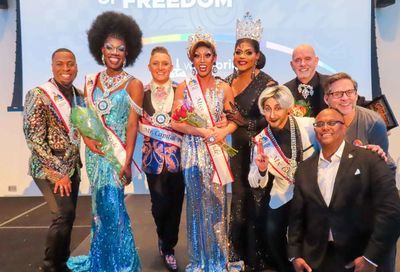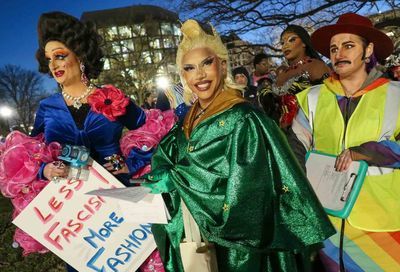Fix to Indiana religious freedom law doesn’t make anyone happy

Indiana lawmakers introduced legislation Thursday morning that would clarify the state’s new religious freedom law does not permit LGBT discrimination, sparking criticism from LGBT-rights advocates and social conservatives alike.
The proposed fix would amend Indiana’s Religious Freedom Restoration Act to explicitly state the law does not “authorize a provider to refuse to offer or provide services, facilities, use of public accommodations, goods, employment, or house to any member or members of the general public on the basis of race, color, religion, ancestry, age, national origin, disability, sex, sexual orientation, gender identity, or United States military service.”
The amendment comes days after Indiana Gov. Mike Pence (R) urged lawmakers Tuesday to send legislation to his desk before the end of the week clarifying the religious freedom law he signed last week does not permit discrimination. However, while the fix must still pass both houses of the Indiana Legislature, it is already facing criticism from both LGBT-rights advocates and social conservatives.
According to the Human Rights Campaign, the proposal fails to explicitly ensure the law won’t be used to undermine existing nondiscrimination laws in certain parts of the state. Moreover, it does not grant statewide nondiscrimination protections to LGBT Hoosiers.
“Though this legislation is certainly a step back from the cliff, this fight is not over until every person in Indiana is fully equal under the law,” said HRC President Chad Griffin in a statement. “At the federal level and in all 50 states, the time has come in this country for comprehensive legal non-discrimination protections for LGBT people that cannot be undermined.”
The American Civil Liberties Union said the outrage over the Indiana law has shined light on the fact that discrimination is still legal in the 28 states that do not have statewide nondiscrimination protections for LGBT people.
“With these amendments, the RFRA cannot be used as a defense in some kinds of discrimination cases. That’s a major improvement. But it still poses a risk that it can be used to deny rights to others, including in education, access to health care, and other aspects of people’s lives. While this is one piece of the solution, it is incomplete,” the ACLU said in a statement. “Religious freedom is important, but it doesn’t give anyone the right to impose their beliefs on others, discriminate, or cause harm.”
“This bill reduces the threat but is far less than this situation requires,” added Jennifer Pizer, national director of Lambda Legal’s Law and Policy Project. “It recognizes there are problems, but does not fix it as LGBT Hoosiers and others urgently need.”
Katie Blair, campaign manager for Freedom Indiana, said the proposed fix lessens the harm , but it is long past time to enact comprehensive nondiscrimination laws. “Indiana businesses have shown they are ready to lead. We look forward to working with them to pass statewide protections against discrimination. That campaign begins today,” Blair said in a statement.
Meanwhile, social conservatives are crying foul and accusing an unusual culprit of bullying Indiana lawmakers into capitulating to LGBT advocates: Big business.
“Religious freedom should not be held hostage by Big Business,” said Tony Perkins, president of the Family Research Council, in a statement. “Big Business is now putting religious freedom in a worse place than before RFRA was signed into law. Gutting RFRA in this manner would put people of faith in the crosshairs of government discrimination as never before. Far from being a ‘clarification,’ this would gut religious freedom in Indiana. Religious freedom doesn’t need a ‘fix.’”
Ryan T. Anderson of the Heritage Foundation labeled the proposed fix “bad policy,” stating it would allow sexual orientation to trump religious liberty. “All citizens should oppose unjust discrimination, but sexual orientation and gender identity laws are not the way to achieve that goal,” Anderson wrote. “Sexual orientation and gender identity laws threaten fundamental First Amendment rights. These laws create new, subjective protected classes that will expose employers to unimaginable liability, and would increase government interference in labor markets in ways that could harm the economy.”
Meanwhile, the number of tech industry leaders who have signed a joint statement calling on “all legislatures to add sexual orientation and gender identity as protected classes to their civil rights laws and to explicitly forbid discrimination or denial of services to anyone” has reached more than 70.
Support Metro Weekly’s Journalism
These are challenging times for news organizations. And yet it’s crucial we stay active and provide vital resources and information to both our local readers and the world. So won’t you please take a moment and consider supporting Metro Weekly with a membership? For as little as $5 a month, you can help ensure Metro Weekly magazine and MetroWeekly.com remain free, viable resources as we provide the best, most diverse, culturally-resonant LGBTQ coverage in both the D.C. region and around the world. Memberships come with exclusive perks and discounts, your own personal digital delivery of each week’s magazine (and an archive), access to our Member's Lounge when it launches this fall, and exclusive members-only items like Metro Weekly Membership Mugs and Tote Bags! Check out all our membership levels here and please join us today!






















You must be logged in to post a comment.